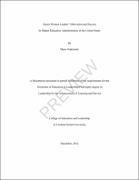| dc.description.abstract | The purpose of this study was to discover and understand the experiences that
influenced women to obtain and persevere in leadership roles in higher education
administrative positions. The results enhanced understanding of what motivates women
to pursue leadership positions and provided strategies for career advancement and
leadership development. This study recognized challenges facing such women, as well as
their tactics for overcoming them.
This qualitative phenomenological research study discovered and explored the
phenomena as lived and experienced by the participants (Creswell, 1998). The purposely
selective sample included 11 women in senior/executive positions in higher education
administration. Utilizing a triangulation technique, the researcher collected multiple
sources of data, including interviewing, observations, and document analysis.
Findings reveal that the participants were intrinsically moved by a great desire to
make a positive difference, to help others, to achieve personal growth and development,
and to create and support the organization’s mission and vision. An array of extrinsic
motivational factors such as academic training and qualifications, mentors, role models,
affiliation, promotion, feedback, recognition, and family support were also identified.
To succeed in their careers, the participants identified self-knowledge, strong
relationships, self-confidence, faith, mentors, networking, and humor as assets. When
faced with complex challenges, they took time to meditate, reflect, consult, and pray
before making decisions. These and other attributes explored proved vital for their career
success. This study results supported motivational and leadership theories of Maslow’s
PREVIEW(1954) Hierarchy of Needs Theory, Burn’s (1978) Transformational Leadership Theory,and Bandura’s (1986) Self-Efficacy Theory. | en_US |


